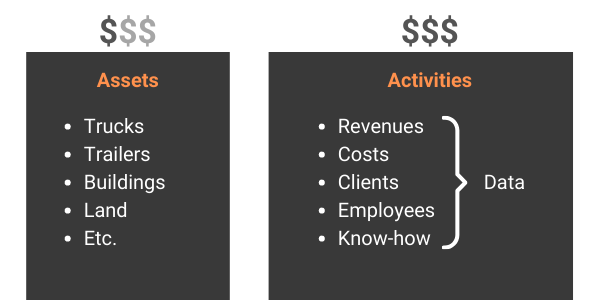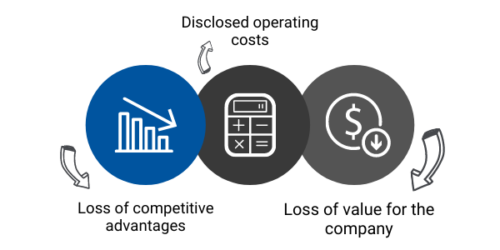How to value a trucking company
First of all, what exactly is the value of a business? Because to protect something, you have to know what it is that you are protecting! The value of a business is the price a competitor or investor is willing to pay for a portion or all of the shares.
Everyone benefits from a high business value, as it speaks to the company’s employment sustainability, and its borrowing capacity or ability to find investors.
In practical terms, a transport company’s value is based on two main components:

Assets are often financed and generally have a low net worth. Competitors can easily procure similar assets. So these create no barrier to entry.
Activities are what creates a barrier to entry for competitors. They make it difficult for a transport company to be replaced. You must protect these activities’ data to protect your business value.
What kind of data does a transport company have?
Your transport company’s data is generated and shared by various objects and systems:
- Dispatch systems (TMS)
- Telematics and telemetry
- Service software
- Load board
- Navigation system
- Imaging, 3PL
Do you own your own data?
Do you own the data generated by your activities, such as the kilometers travelled, your fuel consumption or your telemetry data? The owner of the data may be the company that produces it or an outside organization that collected this data because it was authorized to do so. The bottom line is that this owner can sell the data.
If a third party is given the right to resell the data from your trucking activities – the barrier to entry for your competitors – your company will lose some value.
In some cases, however, sharing some data can be a good strategy if you receive something worth trading it for. A good example of this would be trading your safety and activity data for lower insurance premiums.
The important thing is to be aware of how your data is being used and to understand the business model of the organizations with whom you share your data.
What are the risks of sharing your data?

Without a barrier to entry, without the activities that set you apart, your business is merely an inventory of trucks and other assets. If a competitor gets its hands on your data, instead of acquiring your business it could just buy trucks and become fiercer competition.
For example, an industry giant that has your data could push you to your limit and then buy you out at a low price.
Here are 10 expert tips to protect the value of your business
Thank you to Stéphane Lamarre of Cain Lamarre, Vanessa Henri of Fasken, Pierre-Olivier Ménard Dumas of Stein Monast, France de Gaspé Beaubien of FUSACQ and Nicholas Somos of Left Lane Associates for their collaboration on this article.
1. Secure your information and data
Would you share your data with your biggest competitor? If the answer is no, you then consider your vehicle telemetry information and data to be confidential. You should therefore keep it safe.
2. Watch out for possible breaches
Ask yourself, where does my data go? We use computer tools without actually knowing who has access to the data and where it ends up. Think about how we provide our data to payroll systems, without really knowing what they do with it. Or how we use systems that let drivers use their cell phone or tablet as an electronic logbook, without providing adequate data protection.
3. Actively protect your data for a better valuation
Companies that actively protect their company’s data and use it to make management decisions tend to get higher valuations in transactions. One way to protect your data, and the value it brings to your company, is to ensure that your technology partners never share your data.
4. Read agreements carefully
An agreement sets out the parties’ obligations and rights. Most of us have been guilty of skipping past the terms and conditions when we download a mobile app or fill out an online form. It is of utmost importance, however, to read commercial agreements carefully and understand what you’re agreeing to.
5. Have an agreement translated if you don’t understand the language
The Civil Code has established that your consent must be informed and given freely. Not taking the time to read the contract, or not having it translated if it is in a language you do not understand, is an inexcusable mistake.
6. Make sure you know what you are agreeing to
If your provider does not own the data, does it have the right to use it? In a non-competition, non-solicitation or non-disclosure clause, we usually request the data or its backup, and we ensure that the other party will not use what they have learned from the data.
7. Be prepared in case of a dispute!
When signing an agreement, check where it applies. Will it be enforceable under U.S. law or Canadian law? The agreement also sets out where disputes are to be heard. Find out whether you will be bringing your case to the Quebec courts or the Arizona courts, for example.
8. Develop a data strategy
You business has different types of data. Each type has its own related rights and contractual structure. Your business plan should include a strategy for your data. A company that has a large amount of data but does not have the word “data” anywhere in its business plan is like a property management company that does not have the word “property” in its business plan.
9. Organize, structure and manage your data
Virtually every company will go through some kind of transaction at some point. That’s why it’s important to continually organize and structure your data. Here’s an example of the importance of managing your data and its properties. A company with 150 trucks wanted to buy another that had 10 trucks. Everything was going very well, until the acquiring company found out about the system used by the small business. It was an in-house, less sophisticated system. Since the data was not well organized or structured, the buyer decided not to go ahead with the acquisition.
10. Use non-disclosure agreements
Non-disclosure agreements ensure that your data is not shared without your knowledge and that it remains under your control. Make sure these agreements are drafted based on your needs. To avoid voiding the benefits of your non-disclosure agreements, if you share your data with your providers, make sure you know exactly who owns it and how it is used.
Managing your data adds value to your business. Make sure you are familiar with each of your technology providers’ policies on ownership, confidentiality and monetization of your data and any copies made.


